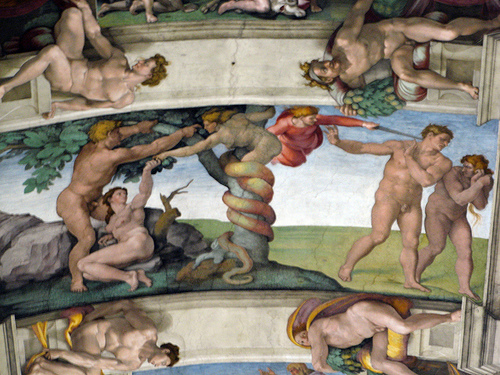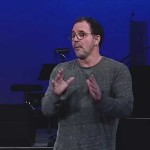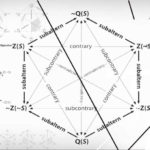We run our website the way we wished the whole internet worked: we provide high quality original content with no ads. We are funded solely by your direct support. Please consider supporting this project.

Sinful Nature and Free Will
Q: If our sinful nature is what causes us to sin/reject God, can we be held responsible for our sins, when this nature resulted from Adam and Eve’s sin? Do we really have the freedom to either choose/reject God if our sinful nature compels us to reject God?
On the other hand, if our sinful nature only influences, but does not cause us to sin, wouldn’t that mean that it is theoretically possible, however improbable, to choose to live a completely sinless life (because of the free will that we have)? How come every single human being that has ever lived will use the freedom that they have to go “that way” instead of “this way”?
Lastly, correct me if I’m wrong, but Scripture seems to suggest that if any of us were in Adam and Eve’s place, we would have chosen to do the same thing and eat of the forbidden fruit. However, if that was the case, did we really have free will to go “this way or that way”, when it seems impossible for any of us to have chosen not to eat the fruit?
A: Here are three considerations regarding “sinful nature” and our free will:
1) I do think it is theoretically possible for an individual to live a sinless life. Yet, this isn’t inconsistent with admitting that every one will inevitably sin. Think of it like this. Every car crash (let us assume) is preventable, if only drivers were more careful. Hence, it is theoretically possible that there will be no car crashes any where on the earth today — or this month — or this year — or ever. But it is certain there will be car crashes, for which drivers are responsible. The thing is, statistical certainty doesn’t negate individual responsibility. We are responsible for every sin we commit, for we didn’t need to do it. We could have done otherwise. It’s theoretically possible to go the rest of our lives without sinning. Yet, it’s certain that, over our lifetime of decisions, we will sin.
2) I see “original sin” as a) our being born screwed up in a myriad of ways, including spiritually; and b) being born in a screwed up world that is oppressed with fallen powers. This doesn’t make us sin, for sin is only sin if we could do otherwise. Yet, it does render it certain that we will eventually sin (see above). This is, in part, why we need a savior.
3) Finally, its important that we not think about this only in individualistic terms. From a biblical perspective (and now, with much confirmation from science), the human community is, in a sense, one person, extending back to Adam. We influence each other, and are responsible, in varying degrees, for one another. So we have collectively gotten ourselves into a situation where we can’t avoid sin, and the responsibility is shared by all of us. This is what Paul means when he says we were in Adam. Yet, we are now placed in Christ — all of us (I Cor. 15:22; Rom 5:14-20). It’s just that we all (including believers) tend to see ourselves and our world as though we were yet in Adam. Transitioning from Adam-thought to Christ-thought is what discipleship is all about.
Image by Randy OHC via Flickr
Category: Q&A
Tags: Adam and Eve, Free Will, Sin, Sinful Nature
Topics: Providence, Predestination and Free Will, Sin
Related Reading

The Danger of the Penal Substitution View of Atonement
About 25 years ago I was traveling on the freeway to somewhere or other and I stopped at a truck stop to get a bite to eat. I sat down at the counter next to this scruffy truck driver who had just started his lunch, and we started up a friendly conversation. Within about fifteen…

In Darkest Times, God is Present
“However much evil was there, it would have been far worse if God was not there pushing back on it.” There is never a time when God is not present, no matter how bad the situation. In this short sermon clip, Greg Boyd talks about how we need to be watchful of the spirit world…

The Logical Hexagon Made Simple
by: Greg Boyd The Hexagaon in a Nutshell For those of you who don’t have the twenty to thirty minutes it will probably take to read this essay but who nevertheless would like to have some idea of what the Logical Hexagon is all about, here is my two sentence elevator speech: The Logical Hexagon…

Imaging God Wrongly: God’s Self-Portrait, Part 2
Our relationship with God depends on the way we imagine God. When we get the image of God right, the doors open for us to trust and relate to God in the ways we were created to do. But there are so many images of God that are entirely messed up. Just think about the…

A Brief Theology of Sin
We were created for unbroken, loving fellowship with God. We see this in the creation story. As we share in this unbroken, trusting fellowship with God, we participate in the very love that the Father, Son, and Holy Spirit share throughout eternity. We also read in the creation story that sin ruptured this fellowship and sidetracked…

A Cross-Centered Evaluation of Responses to Tragedy
I’d like to pick up where I left off on my previous post about Draper’s article entitled “Aurora shooting inspires various perspectives on God and belief.” Toward the end of his article, Draper reports on an informal survey conducted by Stephen Prothero on his CNN Blog. Prothero simply asks people to respond to the question: “Where…
